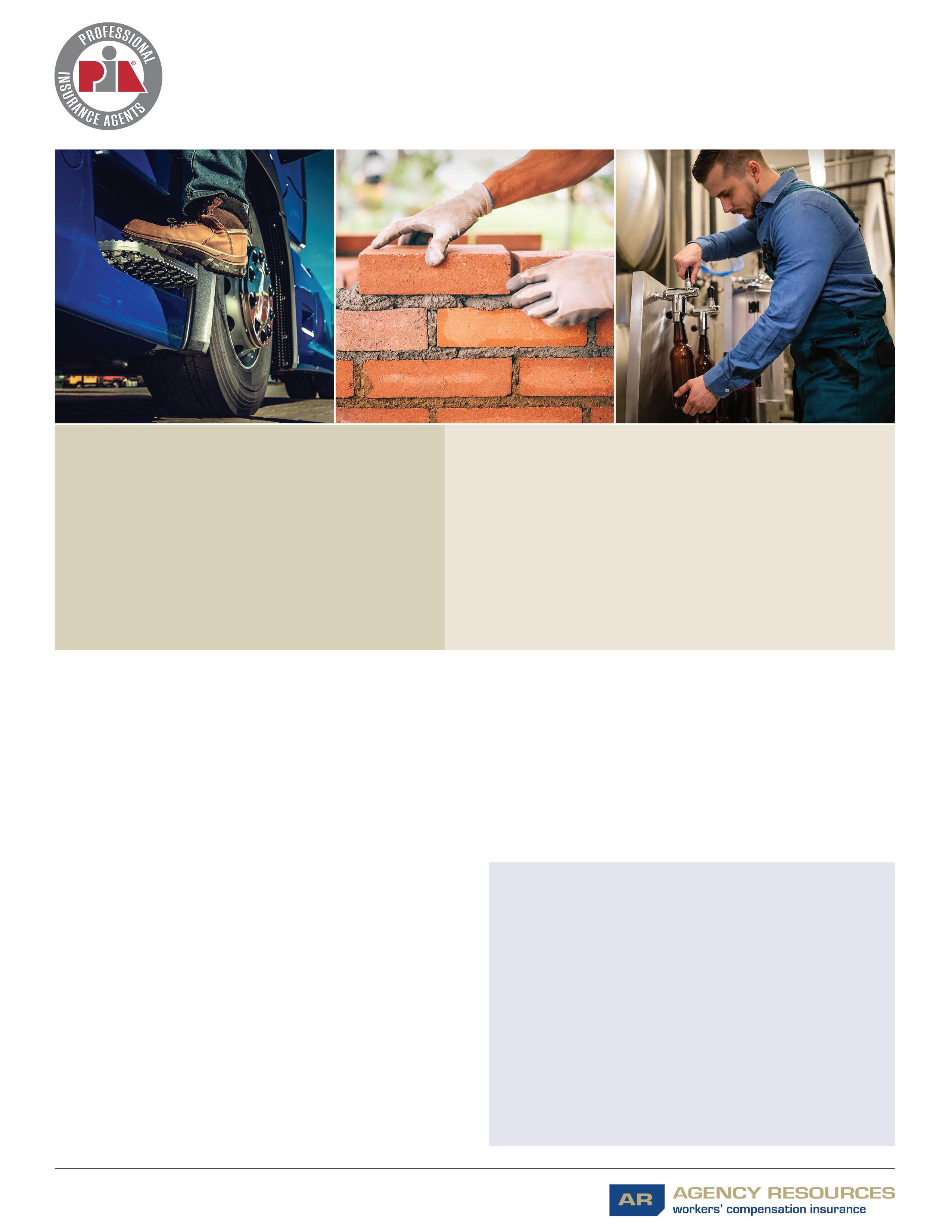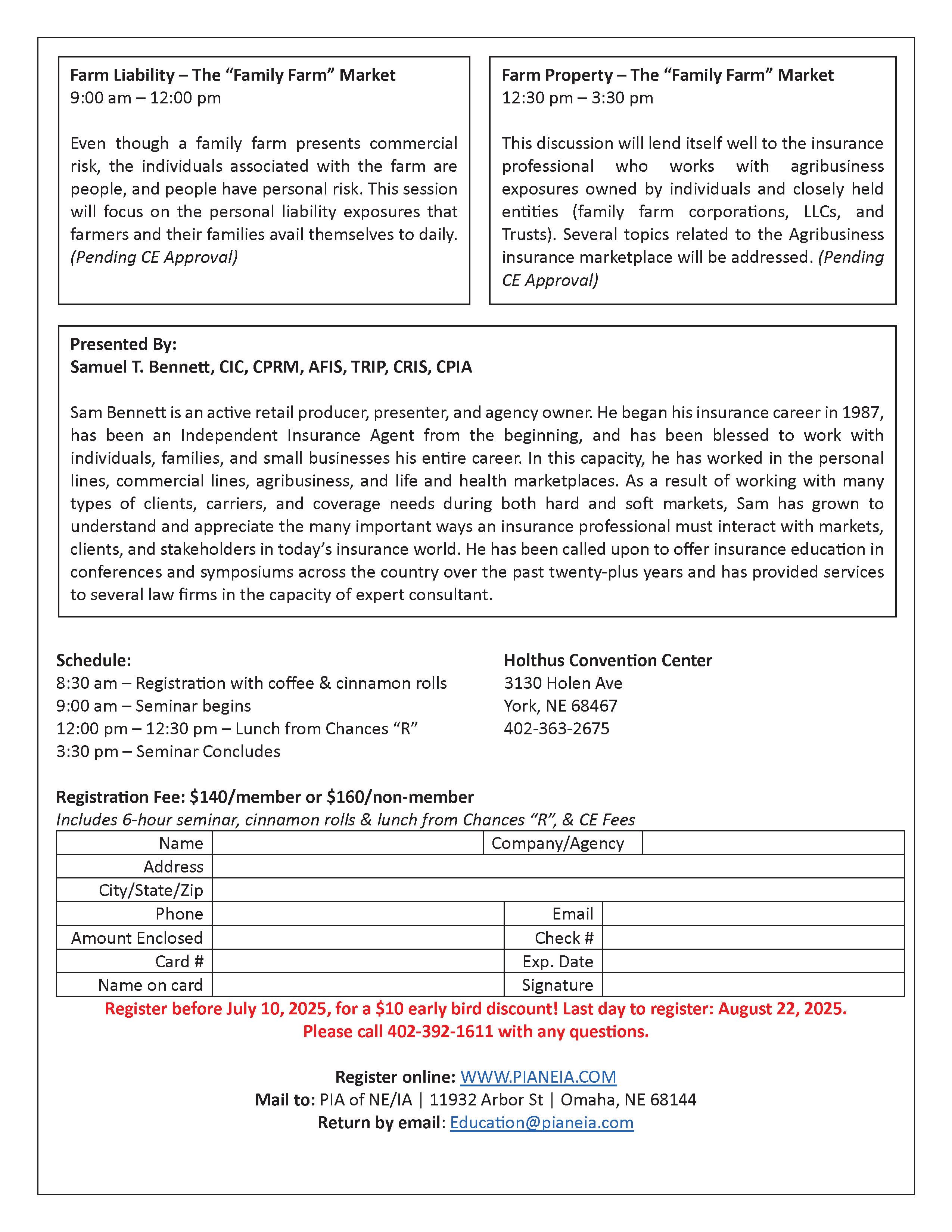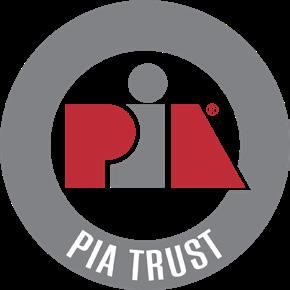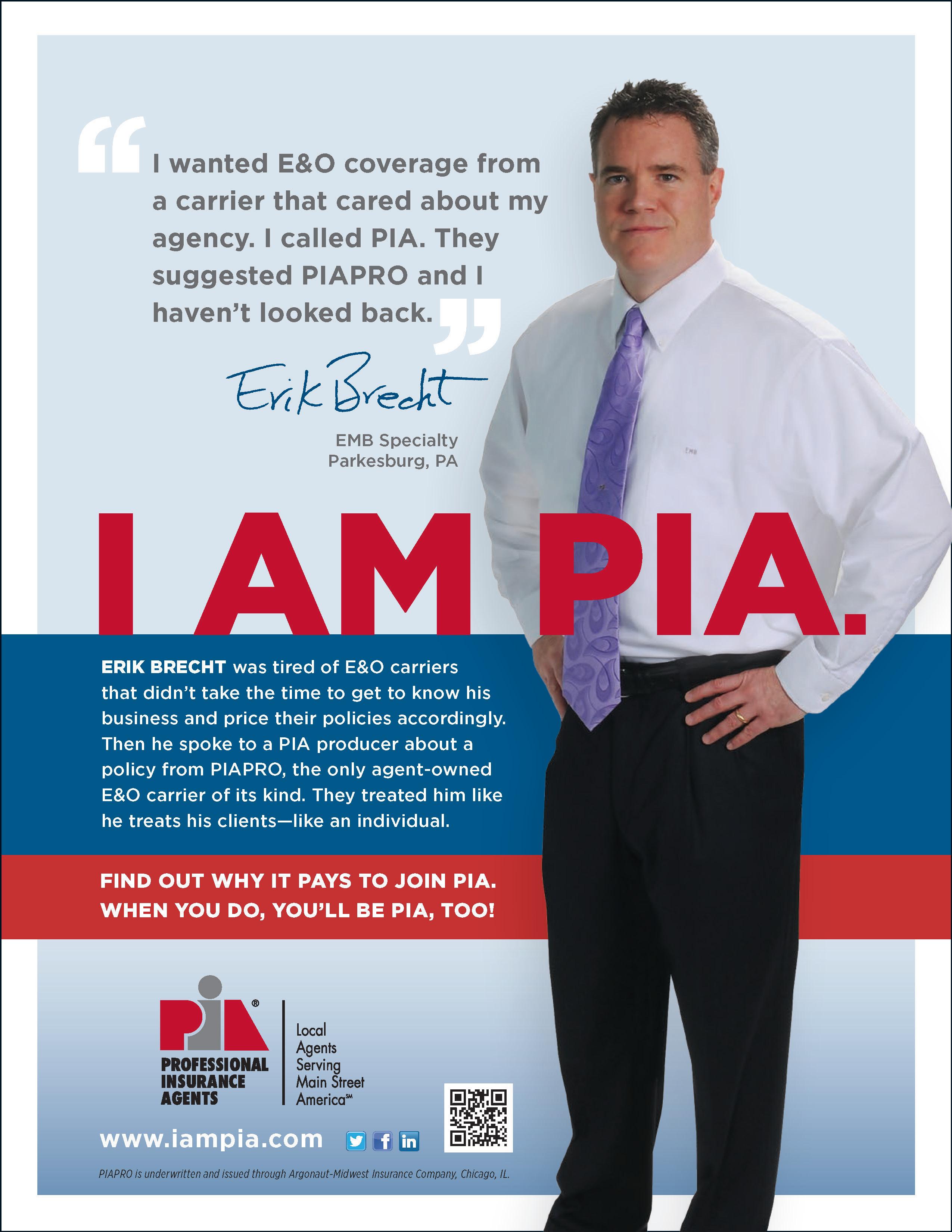

INSIDE
Two Bills in Congress about the Federal Office of Insurance: PIA Wants it Gone — Period » 7
ValuePenguin: 25% of Homeowners in 2025 Dropped by their Insurer » 16
2025 Wildfire Forecast » 29

Did you know that PIA’s company council, The PIA Partnership, has conducted nationwide research about the insurance buying preferences of small business owners?
The research is encouraging because it found that small business owners strongly prefer independent insurance agents as they make choices in today’s online world.
However, the results also serve as a wake-up call that agents must take steps to continue to demonstrate their value and also be more engaged online.
PIA and the companies belonging to The PIA Partnership have created a public website that helps agents understand PIA’s findings.
PIA members also have access to a private website containing a series of strategies and tools to help them stay ahead of online competition in commercial lines.
To access the newest PIA Partnership project, Small Business Insurance & The Internet — The Voice of the Commercial Lines Customer.
If you are not a PIA member and want to access all of the tools available through this program, contact us for a membership application or visit us online at www.pianational.org/header-utility-items/join/Join-PIA

N. Washington St., Alexandria, VA 22314-2353 www.pianet.com | membership@pianet.org | (703) 836-9340

Two Bills in Congress about the Federal Office of Insurance: PIA Wants it Gone — Period | 7
There are two bills floating in Congress having to do with the Federal Insurance Office (FIO).
A Federal Approach to the Wildfire Crisis A Federal Approach to the Wildfire Crisis | 9
The U.S. House of Representatives passed a version of the Fix Our Forests Act in January of this year. A similar bill has been introduced in the Senate by a bipartisan group of senators.
Delivery Driving Worries Worry Nationwide & Probably Everyone Else | 10
Nationwide’s latest survey of delivery drivers reveals that 70% fear being killed or injured in a crash—and just as many worry about being held liable for damages.
PIA National Disaster Relief Fund Distributions | 12
PIA National said thanks to generous support from Progressive, all of the Disaster Relief Funds gathered over the last couple of months have been successfully distributed to those in need.
United HealthCare:
New CEO Says He’ll Fix the Gaps | 13
Tim Noel is UnitedHealth Group’s new CEO. He replaces Brian Thompson who was assassinated in December of last year while getting ready to enter an investor meeting.
Corporate Security: Fallout from the Murder of United Health CEO | 14
UnitedHealth CEO Brian Thompson was murdered last December as he entered the company’s annual investor meeting.
ValuePenguin: 25% of Homeowners in 2025 Dropped by their Insurer | 16
ValuePenguin did a survey and concludes it’s growing ever-harder for homeowners to find affordable insurance for their homes and property.
Insurance Fraud High on White-Collar Crime List | 17
Other than tax evasion, no white-collar crime tops insurance fraud. It sits in second place on the FBI’s data on white-collar crime.
Stress: 1 in 6 Say They’re Stressed Every Day | 18
A survey by the Ohio State University Wexner Medical Center has found a lot of us are really stressed. And the study found 45% of us are stressed to the max at least once a week.
Distracted Driving: 20% of Us Still Text While Driving | 28
Nationwide’s president of personal lines, Casey Kempton said his company’s latest driver survey found 20% of drivers text while driving, 15% use social media behind the wheel, 13% watch videos, and 11% read or write emails.
2025 Wildfire Forecast | 29
AccuWeather is forecasting that somewhere between 7 million and 9 million acres will burn around the country by the end of this year.
PIA NE IA EVENTS
Upcoming Events Calendar 2025 | 20 2025 Rural Town & Agents Seminar | 26
ADVERTISEMENTS

Lindsey
place an ad at 402-392-1611.
Over 130 years of shared success.
Farmers Mutual of Nebraska is now FMNE Insurance. We’ve teamed up with local independent agents to deliver dependable, affordable auto, farm, and home insurance for over 130 years. Our promise is to be “Always alongside you” with prompt, personalized service and unmatched financial strength.

Always alongside you.

PIA FOR NEBRASKA AND IOWA
PIA Association for Nebraska and Iowa is committed to focusing its resources in ways that cast the most favorable light on its constituents. We are dedicated to providing the type of programs, the level of advocacy, and the dissemination of information that best supports the perpetuation and prosperity of our members. We pledge to always conduct ourselves in a manner that enhances the public image of PIA and adds real value to our members.
SUBSCRIBE OR COMMENT
Professional Insurance Agents NE IA
Attention: Editorial Main Street Industry News 11932 Arbor Street, Ste. 100 Omaha, NE 68144
Email: office@pianeia.com Ph: 402-392-1611 www.pianeia.com
The PIA NE IA, Main Street Industry News reserves the right to edit your comments to fit space available. We respectfully ask that you keep the comments to 200-300 words. Cathy Klasi, Executive Director (402) 392-1611
Ad
(402) 392-1611

TWO BILLS IN CONGRESS ABOUT THE FEDERAL OFFICE OF INSURANCE
There are two bills floating in Congress having to do with the Federal Insurance Office (FIO). The latest is Senate Bill 1544. It wants to protect the ability of the FIO to collect consumer data and how it reports that data.
The bill also preserves the right of states to regulate the insurance industry.
A group of 10 senators are sponsoring Senate Bill 1544. The lead sponsor is Alabama Republican Sen. Katie Britt. She said the bill will do away with confusing reporting that will end up costing insurers millions.
She said this will “ensure the state-regulated insurance market remains strong and would prevent redundant and unnecessary data reporting that would needlessly cost millions of dollars and put consumers’ sensitive information at risk.”
A bill in the U.S. House authored by Montana Republican Rep. Troy Downing will do away with the FIO completely. PIA National CEO Mike Skiados says the association has been against the FIO since it was created in 2010 and fully supports Downing’s bill.
It’s time for the FIO to go.
“The Federal Insurance Office Elimination Act will protect the successful state insurance regulatory system by repealing the Federal Insurance Office (FIO), an unnecessary federal

bureaucracy created in the 2010 Dodd-Frank Wall Street Reform and Consumer Protection Act,” Skiados said. “The proper place for the regulation of insurance is at the state level, which has served the insurance industry and consumers well for over a century and is better positioned to protect consumers in the future. PIA thanks Rep. Troy Downing for his leadership in protecting the state insurance regulatory system.”
Downing sat down for an interview with PIA National and explained his reasons for wanting the FIO gone.
“My top priority this Congress with respect to the insurance space is getting my Federal Insurance Office Elimination Act passed by the House of Representatives and enacted into law,” Downing said. “The McCarran Ferguson Act of 1945 made clear that states have sole regulatory authority over the insurance industry. In 2010, Dodd Frank upended this preeminence with the creation of the Federal Insurance Office at the U.S. Treasury. FIO was given ‘the authority to monitor all aspects of the insurance sector,’ clearly violating McCarran-Ferguson.’”
PIA Wants it Gone — Period
Before being elected to the U.S. House, Downing was Montana’s state auditor.
“I was a tireless advocate for the abolishment of FIO as state auditor. As a member of Congress, I plan on bringing the full weight of my Housing and Insurance Subcommittee appointment on the House Financial Services Committee to bear in the fight to dismantle this vestigial office,” Downing added.
He then outlined ways PIA members can help with the effort to do away with the FIO.
“Our independent agents are on the front lines and bear witness to this change, not
members of Congress. PIA’s members are best positioned to educate lawmakers who may not possess a background in insurance. I ask that they impress upon my colleagues the importance of state-centric insurance regulation,” Downing told PIA National. “I am in a position where I can affect change in the legal framework that governs this landscape. To do this in any meaningful or impactful way, it takes the input and context that PIA’s members can provide.”
Sources: PIA National, PIA National and Insurance Business America


A FEDERAL APPROACH TO THE WILDFIRE CRISIS
The U.S. House of Representatives passed a version of the Fix Our Forests Act in January of this year. A similar bill has been introduced in the Senate by a bipartisan group of senators.
Republican Senator Tim Sheehey and Utah
Republican Sen. John Curtis have joined with California Democrat Sen. Alex Padillia and Democrat Sen. John Hickenhooper to establish new forest management requirements. Their goal is to bring some common sense to forest management and keep wildfires from starting and getting out of control.
Deemed a very critical piece of legislation, the bill is rather draconian.
To begin with, the bill sets up some fireshed high risk areas and requires the U.S. Forest Service and the U.S. Geological Survey to form an interagency Fireshed Center to manage those risks.
The agency’s responsibility will be to assess and predict where wildfire is likely to strike.
Some forest management projects will be pushed forward that are now under the National Environmental Policy Act of 1969 (NEPA) and it will exempt some activities from review by NEPA.
Teams will be set up to speed up reviews and interagency consultation processes overseen by NEPA, the Endangered Species Act of 1973 and the National Historic Preservation Act.
To help manage forests, it will put limits on requirements for consultations on threatened and endangered species belonging to the Forest and Rangeland Renewable Resources Planning Act of 1974 and the Federal Land Management Policy Act of 1976.
Lastly, Fix Our Forests Act will limit any litigation popping up from the fireshed management projects and puts a limit on legal fixes courts put into place.
“I don’t think anything could completely prevent wildfires,” Padilla said last week. “But through this work, if we can prevent just one more community from experiencing the heartbreak felt by the families in Santa Rosa or in Paradise
or the Pacific Palisades and Altadena, then this effort would’ve been worth it.”
Groups like Environment America oppose the bill because it “bypasses critical environmental laws that protect our ecosystems and restricts scientific input and public engagement. The bill could have devastating consequences for the environment and endangered species.”
Source: Insurance Journal
DELIVERY DRIVING WORRIES WORRY NATIONWIDE & PROBABLY EVERYONE ELSE
Nationwide’s latest survey of delivery drivers reveals that 70% fear being killed or injured in a crash—and just as many worry about being held liable for damages.
It’s also easy to predict that many delivery drivers fear distracted drivers, and a lot of those replying to Nationwide’s survey said they encounter far too many of them. And while 89% of drivers say their driving is exemplary, 60% say they can’t say the same for other drivers.
At the same time, Mark McGhiey, a risk management and client services leader at Nationwide said a high percentage of delivery drivers admit to having their own risky, and often dangerous, driving behaviors.
"The sharp rise in dash cam usage and handsfree policies sends a clear message: employers are serious about tackling distractions and protecting their drivers,” McGhiey said. “With at least one in five drivers admitting to frequent distractions behind the wheel, and the industry’s belief that this number may be even higher, it’s clear that policy alone isn't enough — consistent driver engagement and training is crucial to turning these efforts into safer roads for everyone.”
More from the survey:
• 84% of the drivers questioned said they have a dash cam in their work vehicle

• That’s up 19% from last year
• 65% say their employer requires that dash cam
• 25% say they’re encouraged to have one
• Just 10% don’t feel any pressure to either have, or not have, one
• 44% say their company enforces a handsfree driving policy and monitors their cell phone activity while they’re driving
• 24% say their company has a handsfree policy but does not monitor their call activity
• 22% of employers do not allow cell phone use at all while driving
• 10% lack any monitoring.
“Enforcing hands-free policies and mobile phone monitoring, along with leveraging technologies like fleet telematics, can significantly reduce risky and dangerous driving habits,” McGhiey noted. “And when drivers see their employers taking proactive steps to reduce accidents through technology, policies and training, they may feel more protected — and more likely to stay. Partnering with an agent and carrier who understand your operations and vehicle usage, and can offer a customized insurance package along with risk mitigation advice, is essential for success.”
Source: PropertyCasualty360.com

PIA NATIONAL DISASTER
RELIEF FUND DISTRIBUTIONS
PIA National said thanks to generous support from Progressive, all of the Disaster Relief Funds gathered over the last couple of months have been successfully distributed to those in need.
In its news release, PIA National said it dispersed $99,825 to 43 grant recipients. One of those was PIA Washington member Tony Williams of Affordable Insurance in Spokane. His agency was hurt by the Gray Fire in Spokane County and received a small grant.
“While this distribution is an important step, we know that much work remains to help
agents fully recover [from disasters]. To that end, we are reaching out to solicit additional funds from our Partnership carriers, company partners, and members,” PIA National said in its news release. “Our goal is to ensure that PIA members and other independent insurance agents continue to receive the support they need to get back on their feet during difficult times. PIA is now accepting donations on its website for PIA Disaster Relief Funds.”
PIA National said grants were dispersed in Florida, Georgia, Iowa, Illinois, Ohio, Louisiana, Minnesota, North Carolina, South Carolina and Texas.

UNITED HEALTHCARE
NEW CEO SAYS HE’LL FIX THE GAPS
Tim Noel is UnitedHealth Group’s new CEO. He replaces Brian Thompson who was assassinated in December of last year while getting ready to enter an investor meeting. His alleged assassin (we refused to print his name) — and other critics of UnitedHealth — say the company has turned a blind eye to a claims policy that leads to, what some say, are unfair denials, high rates and growing higher, and a system that has grown so complex that it’s almost impossible to navigate.
It’s clear how the company views itself, and how the public views the company, are light years apart. Noel says he sees what’s
happening and is on top of those problems. He and company officials are making corrections in areas from delays in prior authorizations to coverage denials.
“We’re fixing them,” Noel said.
Since Thompson’s death, UnitedHealth Group — the nation’s largest insurer — has begun putting tools in place to help doctors and patients quickly check insurance coverage, receive approvals and get estimates on costs while at a physicians office.
Source: Insurance Business America

CORPORATE SECURITY
FALLOUT FROM THE MURDER OF UNITED HEALTH CEO
UnitedHealth CEO Brian Thompson was murdered last December as he entered the company’s annual investor meeting. As a result of the poor security at that event, corporations around the country have begun beefing up security at their facilities and for their executives.
Reuters did an analysis of those security measures and companies like Walmart, General Motors, American Express and chipmaker Broadcom say they have put new security in place or are spending more money on security than they have in the past.
Glen Kucera of the security firm, Allied Universal is not surprised. His company does security for 80% of the Fortune 500 companies. “The number of customers requiring assessments and executive protection has increased 10 to 15 times the number prior to December 4,” he said.
UnitedHealth has spent $1.7 million on security for its top brass since Thompson’s murder. The company said it has spent at least $330,000 for each of its five named executive officers.
Sources: Insurance Journal and Insurance Business America




VALUEPENGUIN
25% of Homeowners in
2025
Dropped by their Insurer
ValuePenguin did a survey and concludes it’s growing ever-harder for homeowners to find affordable insurance for their homes and property. Premium increases hit 66% of homeowners in 2024 and 25% of homeowners have seen their insurance dropped by their insurer in 2025.
ValuePenguin insurance expert Rob Bhatt said that’s up from 19% in 2024.
"The homeowners insurance market is under duress, and it’s creating real challenges for many homeowners. Home insurance is becoming harder to find in many parts of the country, including California, Texas and Florida,” Bhatt said. “Many companies have had to raise their rates to stay solvent. In some cases, they’ve stopped accepting new customers or pulled out of certain areas because they've been spending more to settle claims than they’ve been earning in premiums."
More from the survey:
• The number of people worried they’ll be dropped by their insurer is 50%, double the 26% in 2024
• 67% say their homeowners insurance rate rose in 2024
• 38% of those with rate hikes in 2024 said

theirs was 10% or higher
• 75% expect their homeowners insurance rate to rise in 2025
• 44% say it’s more difficult to afford their insurance this year
• 34% said they reduced coverage this year to afford their premiums
• 58% say they have shopped their insurance this year
• Those switching saved an average of $1,034
• 56% asked their insurer for discounts and those getting one saved an average of $781 a year
• 24% don’t think homeowners insurance is worth the expense
• 31% are thinking about self-insuring
Bhatt doesn’t look for things to get better anytime soon.
“Insurance companies have responded to large-scale natural disasters and inflation by raising rates in many parts of the country,” he said. “Some have stopped accepting new customers in risky areas and are even dropping existing customers. This is making home insurance harder to get and more expensive.”
INSURANCE FRAUD HIGH ON WHITE-COLLAR CRIME LIST

Other than tax evasion, no white-collar crime tops insurance fraud. It sits in second place on the FBI’s data on white-collar crime.
Deloitte took a hard look at the FBI’s data and found insurance fraud costing the average U.S. family somewhere between $400 and $700 a year. That’s because insurers increase costs to compensate for the losses.
On an annual basis, insurers lose about $122 billion a year from fraud. These days more insurers are employing fraud detection technology and services. In 2023 they spent $4 billion on such services. By 2032 it’s estimated the figure will be eight-times that at $32 billion.
“Continuing to raise premiums to offset fraud losses is likely not a viable strategy for longterm profitability and market share growth,” Deloitte’s report noted. “By combining AIdriven anti-fraud technologies with advanced data analytics (depending on the law of each jurisdiction), insurers can enhance their capabilities to detect and prevent fraud. Insurers that pair sophisticated technology with
human enablement can detect claims fraud and could potentially save billions of dollars for policyholders.”
AI is going to be a huge help in detecting and preventing insurance fraud. Suspicious language on claim forms, emails and social media posts can be identified. Audio and video can be easily analyzed as can satellite images of areas not easily seen from the ground.
The internet is a source of real-time analytics. It can reconstruct crashes. Data from vehicles can also be analyzed to legitimize a claim. Security cameras have been around for awhile and have been incredibly helpful but combined with AI, it increases the ability to catch fraudsters.
Simulation models can be used to replicate the behavior of medical providers and companies doing repairs. It can also catch over-billing and unnecessary services.
Sources: PropertyCasualty360.com and PropertyCasualty360.com
STRESS

1 IN 6 SAY THEY’RE STRESSED EVERY DAY
A survey by the Ohio State University Wexner Medical Center has found a lot of us are really stressed. And the study found 45% of us are stressed to the max at least once a week.
The stressor is news or what we’re seeing on social media.
Ohio State Center for Integrative Health director, Maryanna Klatt, PhD said watching, listening or reading news or things on social media have stressed 16% — or close to 1 in 6 — every day.
“Stress, in itself, is not bad. But it is problematic when it becomes your chronic state of being, and when no action is taken to address the stress,” Klatt said. “We only become stressed about situations or people we care about. This tells us something about what we value. The most important thing is to use that knowledge to transform our stress into ways that enrich our humanity rather than lessen it.”
She offers several tips for managing stress, including:
• Move your body — walking, gym exercises or other forms of exercise
• Spend time with others and talk to them to increase feelings of being connected
• Spend some time away from social media
• Spend more time in nature
She also said stress impacts us at every level of our lives from work to home and that stress can also lead to physical issues.
“Only 7 percent of survey participants said they do nothing to help manage their stress. This is good news that most people are aware that managing stress is a need,” Klatt said. “Think of the most stressed-out person you know. Do you want to be around them or spend a lot of time with them? My guess would be ‘No.’ Whatever you are doing to manage your stress, keep doing it.”
Source: Carrier Management
Events Calendar 2025

June 4-5, 2025
4-5,
June 10,
June 10, 2025
June 10, 2025
June 12, 2025
June 12, 2025
July 9, 2025
The Fine Print: Understanding the Contractual Obligations of Your Insured
July 10, 2025 Homeowners Endorsements Insureds Don't Want (But Do Need)
July 10, 2025 An Hour with Nicole: Making Sense of Homeowners Deductibles (Once and For All!)
July 15, 2025 Certificates, Contractors, and You: Fights, Coverage Issues, Best Practices
July 15, 2025 Reasons Personal Lines are Broken (and What to Do About It)
July 16, 2025 CISR: Insuring Commercial Property
July 17, 2025 An Hour with Patrick: Reinsurance: How It Works & Why It Matters
July 22, 2025 An Hour with Sam: Commercial General (CGL) vs. Farm Liability: Key Differences for Farm Accounts
July 22, 2025 Liar!: An Agent's Role in Identifying & Handling Fraud
22-23,
July 29, 2025 Just Use Mine: Home, Vehicle and Other Sharing Exposures Insurance Doesn’t Like
July 29, 2025 Dawn of New Age or End of the World? Emerging Risks That Make You Wonder
July 30, 2025 An Hour with Dave: E&O: Talking Exposures with an Attorney
July 31, 2025 Forward and Backward: Insuring Emerging Risks, Surviving Deteriorating Markets
August 5, 2025 Imminent Danger: Spotting Site Risks & Saving Construction Insureds
August 5, 2025 Ethics, Diligence, Success: What Agencies Need to Know
August 5-6, 2025 CIC Life & Health Institute
August 6, 2025 An Hour with Dave: Understanding Ordinance or Law (Because Insureds Still Don’t)
August 7, 2025 Flood Insurance: What You Need to Know
August 12, 2025 Commercial Property: Claims, Coverages, Consequences
August 19, 2025 CGL Endorsements That Will Break Your Policy
8 - 11 AM
Webinar: 8 - 10 AM
August 19, 2025 An Hour with Cathy: I Pay What? How Commercial Policy Deductibles Work
August 21, 2025 Why Inadequate EPLI Will Close Your Business (and What to Do About It)
August 21, 2025 Stinkin Rich, Insurance Poor: P&C Coverage Challenges for High-Net-Worth Individuals
August 25, 2025 CISR: William T. Hold Seminar
August 26, 2025 Why Are You Here?! Insurance Issues with the People and Stuff in Your House
August 26, 2025 Farm Seminar
August 28, 2025 Eroding: The Personal Lines Implosion and What Happens Next
August 28, 2025 An Hour with Nicole: Personal Lines: Read the %^&* Form!
September 9, 2025 CISR: Agency Operations
September 10, 2025 Homeowners Endorsements Insureds Don't Want (But Do Need)
September 13-16, 2025 PIA National Fall Leadership Meetings - Starts Sunday
September 16, 2025 PIA National Installation of New PresidentTuesday, 5:30-7:00 PM 5:30-7:00 PM
September 17, 2025 PIA National Advocacy Day on The HillWednesday - Depart Thursday
September 16, 2025 Reasons Personal Lines are Broken (and What to Do About It)
October 14, 2025 Certificates, Contractors, and You: Fights, Coverage Issues, Best Practices
October 14, 2025 Commercial Property: Claims, Coverages, Consequences
October 16, 2025 Eroding: The Personal Lines Implosion and What Happens Next
October 16, 2025 An Hour with Nicole: Personal Lines: Read the %^&* Form!
October 21-22, 2025 CIC: Commercial Multiline Institute All States Omaha, NE
October 23, 2025 Just Use Mine: Home, Vehicle and Other Sharing Exposures Insurance Doesn’t Like
October 23, 2025 Dawn of New Age or End of the World? Emerging Risks That Make You Wonder
October 28,
October 28, 2025 CISR: Commercial Casualty 1
October
November 18-19, 2025 CIC: Commercial Casualty Institute
November















DRIVING - 20%
OF US STILL TEXT WHILE DRIVING
Nationwide’s president of personal lines, Casey Kempton said his company’s latest driver survey found 20% of drivers text while driving, 15% use social media behind the wheel, 13% watch videos, and 11% read or write emails.
And then there are the over half of those surveyed eating or drinking while driving. Another 13% are getting ready for work.
Sadly, and quite frightening, 47% are probably right that built-in touch screens and navigation displays on newer autos are distracting. With entertainment and communication features in them, they definitely contribute to driver distraction.

Help Build Your Family’s Financial Future With PIA Trust Insurance Plans
As a PIA Member*, you and your employees have access to a variety of high-quality, competitively priced insurance plans. With PIA Trust Insurance Plans, you have the flexibility to customize your protection to best meet your family’s insurance needs. With the exception of Basic Life**, your employees are also eligible to apply for all of the plans without your participation.
States][DC,GU,MP,PR,VI]
“Far too many people believe they’re immune to distraction or that a ‘quick check’ won’t hurt,” Kempton said.
Aggressive Behind the Wheel? Not Surprising!
• 92% use phones while driving
• 92% say they’re driving faster
• 92% admit to being a little more aggressive
• 88% say they’re more reckless behind the wheel
Why Driving Feels More Draining Than Ever
• 33% say stress is up due to traffic, recklessness, and navigation
&

• 72% have witnessed road rage
• 66% are irritated by other drivers
• 34% admit road rage is a direct result
Confidence vs. Reality on the Road
• Only 15% rate others as very good or excellent drivers
• Yet 80% say they are good drivers
• Would You Drive Safer for a Discount?
• 70% would join a program that rewards good driving
• 50% like the idea if it cuts their insurance costs
Source: Insurance Journal
2025 WILDFIRE FORECAST

AccuWeather is forecasting that somewhere between 7 million and 9 million acres will burn around the country by the end of this year. The historical average — says the National Centers for Environmental Information — is 7.5 million acres.
Half of the country is seeing abnormally dry conditions, or drought and 9% are in extreme drought.
On the West Coast we’ll see cooler water temperatures that will produce an increase in storms. Some of that is good news as AccuWeather says the winter moisture that’s
hanging around will limit wildfire activity along the coast and into the Rockies.
But later in the year increased vegetation could increase fire potential. So look for more wildfires in the Northwest, the northern Rockies, in the Southwest and the South Central states.
AccuWeather is also forecasting dangerous fire conditions east of the Cascades and into the northern Rockies. Lightning from dry thunderstorms could cause lots of fires in those areas.
Source: Insurance Journal

